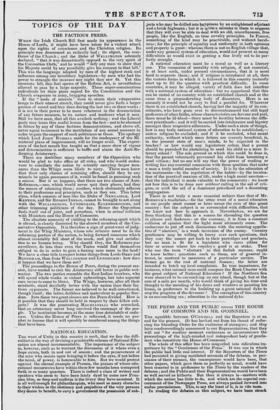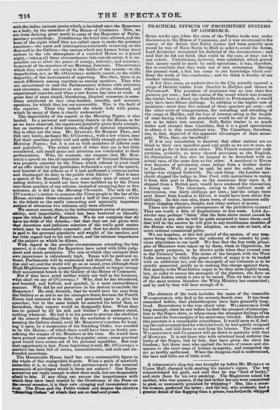THE PRESS AND THE PUBLIC versus THE HOUSE OF COMMONS
AND MR. O'CONNELL.
THE squabble between O'CONNELL and the Reporters is at an end for the present. He has backed out from his threat of enfor- cing the Standing Order for the exclusion of strangers ; and they have condescendingly announced to our Representatives, that they will not "for another moment embarrass or inconvenience the proceedings of the high-minded and independent body of gentle- men who constitute the House of Commons."
The whole of this affair has been magnified into ridiculous im- portance by the "Gentlemen of the Press." It was one in which the public had little real interest. If the Reporters of the Times had persisted in giving mutilated accounts of the debates, in pur- suance of their menace, the consequence would have been, that other papers, which gave them as perfectly as usual, would have been resorted to in preference to the Times by the readers of the debates ; and the Public and their Representatives would have been as well served as hitherto. But thus it always is—matters with which the nation has little to do, and which are the especial con- cernment of the Newspaper Press, are always pushed forward into undue preeminence. This, to say the-least of it, is in vile taste. In reading the debates on this subject, we have been struck With the indisc:iminate praise whien is lavished upon the Reporters as a body, by the members of the House of Commons. Now, we
are from denying great merit to some of the Reporters of Parlia-
mentary proceedings. ‘Considering the brief time allowed, and the hour of the night when they are called upon to make the greatest
exertions—the noise and interruptions constantly occurring on the floor and in the Gallery—the nausea which any human being must endure in the vile atmosphere of a crowded House on a grand night,—taking all these circumstances into consideration, it is im- possible not to allow the praise of energy, industry, and accuracy, to several of the reporters of our Morning Journals. The mistakes which they commit are owing to the faults of the system—to the imperfection, not, as Mr. O'CONNELL unfairly asserts, to the wilful depravity, of the instruments of reporting. But then, there is as much difference among reporters as among speakers. They who are accustomed to read the Parliamentary debates with attention and closeness, can discover at once when a clever, educated, and experienced reporter, and when a raw dunce, has been at work. A great deal of most stupid, blundering, illogical nonsense, is some- times attributed to very clear-headed, sensible, and accurate speakers, for which they are not answerable. This is the fault of the reporter. Then why bedaub the whole body with praise, which by many of them is clearly undeserved ?
The impartiality of the reports in the Morning Papers is also lauded. In a personal and amusing dispute in the House, as far as we have observed, the reports are generally given fairly enough; but on matters of a drier nature, though of national importance, this is often not the case. Mr. STANLEY, Sir ROBERT PEEL, and (till very lately, perhaps) Mr. O'CONNELL, with a few others, may End their speeches pretty well and quite fully enough given in the Morning Papers; but it is not so with members of inferior note and popularity. The actual merit of what. they say is but little
• considered, and small pains and attention are vouchsafed to their . performances. Who, for example, can suppose that Mr. ROE- BUCK'S speech on the all-important subject of National Education was properly reported by the Times, which refused to avail itself
• of an offer made by that gentleman to furnish a copy of the speech, and boasted of the refusal as if it had performed a virtuous action
and discharged its duty to the public with fidelity ? Had it been a speech of Sir ROBERT PEEL, or some other man of smart and taking delivery, it would not have been huddled up by the Times into three quarters of one column, instead of occupying four or five columns, as it did in the Morning Chronicle. The talk on Mr. O'CoNsreeL's motion to summon the Times people to the bar of the House, occupies three columns and a half of that journal ; while to the debate on the really interesting and nationally important subject of education two columns only were allowed.
We cannot concur, then,in the indiscriminate praise of accuracy, ability, and impartiality, which has been bestowed so liberally tupon the whole body of Reporters. We do not complain that we have too litae of the debates,—but that they are not given with that discretion and judicious selection of the really good matter -which may be reasonably expected; and that too much attention is paid to the personal popularity and weight of the speaker, and too little regard had to his real merit, and the intrinsic importance of the subject on which he dilates.
With regard to the peculiar circumstances attending the late quarrel, it is clear that the Reporters have acted with little judg- ment and much petulance. The rate at which they estimate their own importance is ridiculously high. Taxes will be paid and re- fused, Parliaments will be summoned and dissolved, the sun will rise and set, and the world will go on as usual, even although their High Mightinesses the present Reporters should no longer occupy their accustomed bench in the Gallery of the House of Commons.
But if they have acted neither wisely nor well in the business, what shall we say of O'CONNELL ? -Why, that he has blundered, and boasted, and bullied, and quailed, in a most extraordinary manner. Why did he not persevere in his motion to exclude the Reporters? He said, forsooth, that he would turn his eyes from the Gallery so as not to see the strangers there, because the Fourth Estate had returned to its duty, and promised again to give his speeches; but in the same breath he asserted his belief that, as heretofore, their reports would be designedly false. What then has be gained by all his talk and bluster? As matters stand, nothing whatever. He had it in his power to procure the abolition of the absurd Standing Order for the exclusion of strangers, by keeping the Gallery closed, until Mr. ROBINSON'S motion for keep- ing it open, by a suspension of the Standing Order, was acceded to by the House,—of which there could have been no doubt, con- sidering the temper of the Members at the time. He would then have gained some advantage for the popular cause ; some practical good would have arisen out of his personal squabbles. But now that opportunity is lost. From beginning to end, Mr. O'CoNsteLe's conduct has been full of errors, inconsistencies, and rash and un- founded assertions.
The Honourable House itself has cut a contemptible figure in the whole of this undignified dispute. What a mark of mawkish imbecility it is, to cling fondly and pertinaciously to the nominal possession of privileges which it dares not enforce ? Our Repre- sentatives are ready enough to show their tegth, but are desperately afraid to bite. If any thing can excuse the impertinence with whieh they have been treated by the Gentlemen of the Press on the :recent occasion, it is their own cringing and inconsistent con- duct. The Press and the Public violate and despise the abortive nkitandingOadare.of which they are.solondand proud.



















 Previous page
Previous page